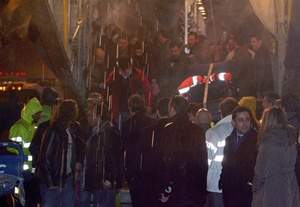
As soon as the crisis in Libya broke out, the Foreign Ministry activated
it Crisis Management Unit – under the coordination of the Foreign
Ministry’s Secretary General – and, in cooperation with the Defence
Ministry, 3 transport aircraft were put on alert while landing permits
were sought from the Libyan authorities for five airports (Tripoli,
Surt, Sabha, Benghazi and Jalu).
The Crisis Management Unit gathered all information on the presence and status of Greeks in Libya
All Greek companies active in Libya – mainly construction companies – were asked to report the Greek personnel employed at the time the crisis broke out and the construction site or place where they were working.
Some 270 Greek citizens and contact numbers were registered, despite the fact that telecommunications – particularly cell phone networks – were to a large extent down, as were telephone links with Greece. The Greeks in question were at locations scattered across Libya, with distances of up to 1,200 kilometres between the various locations, some of which were very difficult to access.
Based on this data, a plan was drawn up to gather the majority of the Greeks – provided safe transport was possible – in five central points in Libya (Tripoli, Surt, Sabha, Benghazi and Jalu), so that they could then be evacuated by air and sea.
Because the Tripoli airport had been heavily damaged and shut down, the evacuation began with the embarkation of 46 Greeks on a Greek commercial ship that was also carrying Chinese citizens to Crete.
Following persistent diplomatic efforts, the Libyan authorities gave permission for three Greek C-130s to land.
Two aircraft – carrying Deputy Foreign Minister Dollis and diplomatic personnel, including speakers of Arabic – flew to Tripoli, evacuating 171 persons, including Greeks, Cypriots and some citizens of other countries. Among those evacuated was a Greek Embassy employee with bullet wounds.
A third aircraft, under Embassy Councillor Vasilokonstantakis, flew into Sabha, 662 km south of Tripoli, where it picked up 36 persons, including Greeks, Cypriots and some citizens of other countries. The evacuees were from four different locations within a radius of 200 km from Sabha. The Greek C-130 was only the second aircraft to carry out evacuation at Sabha airport, which does not have electronic assistance systems.
The same C-130 then landed at Surt, where it evacuated 23 Greek and Cypriot nationals who were in the area. These included the Greek nationals employed at Es Sider port, between Tripoli and Benghazi, who were not allowed by the Libyan authorities to board a Greek commercial vessel that had come to harbor earlier and offered its assistance.
Another two persons from the Tripoli region were evacuated to Bucharest, where they were received by the Greek Embassy, which arranged for their transport to Thessaloniki.
Last night – following cooperation between the Greek and German Foreign Ministries and the German Air Force, which had flown two C-160 aircraft to Souda Airbase for this purpose – 8 Greeks, who had been at Jalu, 400 km south of Benghazi, were evacuated from Nafura airport. Also evacuated from Nafura airport were 11 Cypriots and 113 other persons from various countries. This was the first evacuation by air from this inaccessible area. An hour after arriving from Libya, the Greek and Cypriot evacuees were flown commercially to Athens, while the Prefecture of Crete provided food and shelter for the foreigners without valid travel documents, until such time as their consulates provide for their repatriation.
Throughout the evacuation operations, the Navy frigate “Psara” coasted off Libyan shores.
It is to be noted that the whole evacuation operation was carried out virtually incommunicado, given that, with very few exceptions, cell phones did not work in Libya.
Finally, it is to be noted that Greece is playing a key role in the huge humanitarian operation for the repatriation of foreign nationals in Libya, functioning as a way station in the evacuation of thousands of Chinese nationals and hundreds of citizens of other third countries.
February 28, 2011


